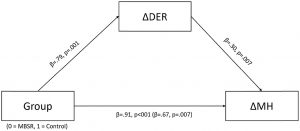Reduce Stress and Improve Well-Being in Nursing Students with Mindfulness
By John M. de Castro, Ph.D.
“mindfulness meditation has a positive impact on nurses’ and nursing students’ stress, anxiety, depression, burnout, sense of well-being and empathy.” – Pamela van der Riet
Stress is epidemic in the western workplace with almost two thirds of workers reporting high levels of stress at work. In high stress occupations, like healthcare, burnout is all too prevalent. It is estimated that over 45% of healthcare workers experience burnout. Burnout not only affects the healthcare providers personally, but also the patients, as it produces a loss of empathy and compassion. So, preventing burnout has to be a priority.
It is important that methods be found to reduce the individual’s responses to stress and to improve their resilience. Contemplative practices have been shown to reduce the psychological and physiological responses to stress. Indeed, mindfulness has been shown to be helpful in treating and preventing burnout, increasing resilience, and improving sleep. Developing mindfulness early in healthcare careers could work to prevent later burnout. There has been considerable research on this topic. So, it makes sense to summarize what has been learned regarding the effects of mindfulness training for nursing students.
In today’s Research News article “Mindfulness-Based Interventions for Undergraduate Nursing Students in a University Setting: A Narrative Review.” (See summary below or view the full text of the study at: https://www.ncbi.nlm.nih.gov/pmc/articles/PMC8621067/ ) McVeigh and colleagues review and summarize the published research on the effectiveness of mindfulness training on the psychological well-being of nursing students. They identified 15 published research studies.
They report that the published research found that mindfulness training for nursing students resulted in significant decreases in anxiety, depression, perceived stress, and negative coping strategies, and significant increases in mindfulness, self-efficacy, emotion regulation, and self-awareness. These benefits accrued regardless of the type and form of mindfulness training from meditation, to Mindfulness-Based Stress Reduction (MBSR), to mindful movement practice.
These results are very promising. Mindfulness training of nursing students appears to markedly improve their psychological well-being. There was no long-term follow-up reported. So, it is not known whether the training has lasting effects and potentially improve resilience to later career stresses and reduce burnout. Future research needs to follow-up to identify whether the effects of this early intervention might assist the nurses in their later careers.
So, reduce stress and improve well-being in nursing students with mindfulness.
“Mindfulness practices have been found beneficial for nurses. The program has been found to increase self-compassion, serenity, and empathetic concern as well as decrease burnout and self-reported distress “ – Sandra Bernstein
CMCS – Center for Mindfulness and Contemplative Studies
This and other Contemplative Studies posts are available at the Contemplative Studies Blog http://contemplative-studies.org/wp/ andon Twitter @MindfulResearch
Study Summary
McVeigh, C., Ace, L., Ski, C. F., Carswell, C., Burton, S., Rej, S., & Noble, H. (2021). Mindfulness-Based Interventions for Undergraduate Nursing Students in a University Setting: A Narrative Review. Healthcare, 9(11), 1493. https://doi.org/10.3390/healthcare9111493
Abstract
(1) Introduction: Undergraduate (UG) nursing students are vulnerable to stress throughout their education, known to result in burnout, with high attrition rates of up to 33%. There is a growing body of evidence to suggest that mindfulness-based interventions are effective for the management of anxiety, depression and wellbeing, thereby reducing stress in healthcare provider populations. The aim of this narrative review was to synthesize and provide a critical overview of the current evidence in relation to mindfulness-based interventions for UG nursing students in a university setting. (2) Methods: A review of the literature was conducted in March 2020 and updated in May 2021, utilising the databases CINAHL, Medline and PsycINFO. (3) Results: Fifteen studies were included in the review, with three common themes identified: (i) the positive impact of mindfulness on holistic wellbeing, (ii) mindfulness-based techniques as a positive coping mechanism within academic and clinical practice, and (iii) approaches to the delivery of mindfulness-based interventions. (4) Conclusions: Mindfulness-based interventions are effective strategies for the management of stress, development of self-awareness and enhanced academic and clinical performance in undergraduate nursing students. No ideal approach to delivery or duration of these interventions was evident from the literature. Best practice in relation to delivery of mindfulness-based interventions for nursing students is recommended for future studies.
https://www.ncbi.nlm.nih.gov/pmc/articles/PMC8621067/









